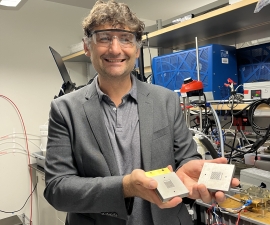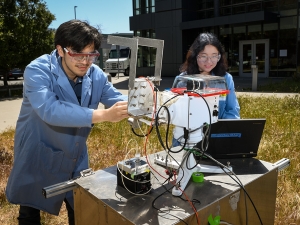

Research Bio
The Boettcher laboratory studies, designs, synthesizes, fabricates, and models materials and devices for electrochemical applications such as energy storage and conversion. The team broadly works to reveal the fundamental details of how interfacial electrochemical reactions can be controlled and is using that new understanding to design materials and devices to drive global impact through electrochemical technologies, for example in hydrogen production and carbon-dioxide-capture technology.
Specific interests include the synthesis and study of heterogeneous electrocatalysts for reactions such as water oxidation with defined molecular and nanoscale structures; the use of computer simulation and direct nanoscale electrical measurements to understand semiconductor-electrocatalyst interfaces in photochemistry; the development of alkaline-membrane and advanced liquid-alkaline electrolyzers for low-cost, scalable, hydrogen production; fundamentals and applications of bipolar membranes for example in the production and regeneration of carbon-dioxide-capture media; and understanding electric-field driven interfacial ionic reactions such as water dissociation and corrosion.
Boettcher is teaming with other UC Berkeley faculty to establish a world-leading flagship Center for Electrochemical Science, Engineering, and Technology (CESET), http://electrochemistry.berkeley.edu
The team strives to create an inclusive, respectful environment to support a diverse community of researchers. We welcome and encourage talented and motivated individuals of any and all racial, cultural, and socioeconomic backgrounds, nationalities, and all sexual orientations, gender identities, and disabilities, to join us in Berkeley in our pursuit of advancing electrochemical science and technology for the betterment of human civilization.
Research Expertise and Interest
electrochemistry, materials chemistry, heterogeneous catalysis, hydrogen generation, electrolysis, batteries, membrane science


